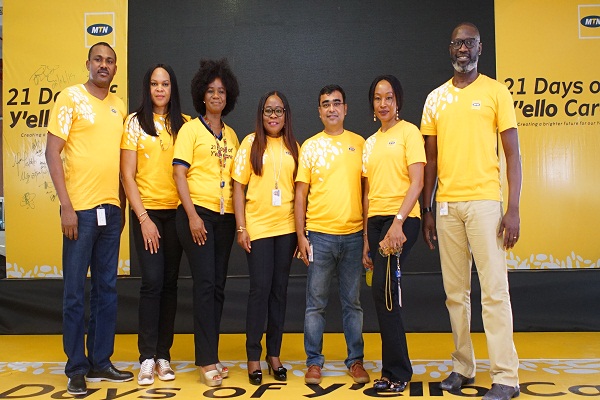Telecom
Nigeria Ranks 5th Worst for SIM-Card Registration Laws

Nigeria has been ranked as the 5th worst among over 150 countries by their SIM-card registration laws exploring data that is collected, what happens to the data and other restrictions such as number of SIM-cards allowed.

A recent report by Comparitech, an organisation which compares tech services around the world, Nigeria was placed alongside countries where invasive biometric data is mandated for SIM card registration particularly for the reason that the length of time this data is held by the collating body is unknown or unclear.
The report found Nigeria scoring 13 out of a possible 20 (20 being the worst score) thanks to, among other things, the collection of biometric data.
With fresh reports that National Identification Numbers (NIN) may soon become necessary for SIM registrations, it is important to start asking how well the telcos and the industry regulatory agency, Nigerian Communications Commission (NCC) have structured their agent networks to ensure sensitive data does not fall into wrong hands.
With more than 5.1 billion global mobile phone users accounting for some 70 percent of the world’s population, a number of governments have looked into implementing SIM-card registration laws to prove identity and collect user data, writes Comparitech.
Mandatory SIM-card registration with real name and personal details is necessary in most countries, but governments lack transparency when it comes to data use.
The laws for subscriber identification module (SIM) registration in Nigeria and fourteen other countries are considered the most invasive in the world, according to a new study by Comparitech, an online platform that provides tech research.
The study examines privacy in mobile phone usage in 150 countries and how national governments impose SIM-card registration laws to collect data on their citizens.
The report identifies the requirement of biometrics in the registration process as one of the factors that determine the level of intrusiveness of the laws.
Nigeria is among countries that currently have biometric registration laws.
According to Comparitech, SIM-card registration in Nigeria requires both fingerprints and a facial image.
Other countries with biometric requirement in the registration process are China, Tanzania, Saudi Arabia, Singapore, Tajikistan, Thailand, Uganda, United Arab Emirates, Afghanistan, Bahrain, Bangladesh, Benin, Oman, Pakistan, Peru, and Venezuela.
Tanzania is at the top of the ranking of countries with the worst SIM-card registration laws, scoring 19 points out of the maximum of 21 points. Next on the ranking is Saudi Arabia (17 points), followed by North Korea and Uganda (15 points each). Lebanon, Pakistan, Singapore, and Sri Lanka have a score of 14 points; while Nigeria, Bahrain, Bangladesh, China, Myanmar, Tajikistan, United Arab Emirates scored 13 points.
Other indicators used in the study to determine the level of intrusiveness of SIM-card registration laws include whether the data collected is stored by telecommunication providers or shared with government agencies; the requirement by law enforcement to gain access to the data; for how long the data is stored; and whether or not there are data privacy protection legislations.
Apart from biometrics, photo ID is a requirement to sign up for phone service in some countries. Other requirements are a permanent address, date of birth, nationality and gender.
“In China, anyone registering a new phone number now needs to submit a facial scan. This is also happening in Singapore,” said Paul Bischoff, a tech writer at Comparitech.
According to the report, while most countries require mandatory SIM-card registration, this requirement does not exist in about 45 countries and jurisdictions. Countries without mandatory SIM-card registration laws include United Kingdom, United States, Bahamas, Bosnia and Herzegovina, Cabo Verde, Canada, Croatia, Denmark, Finland, Hong Kong, Ireland, Israel, Mexico, Portugal, and Sweden.
Discussing how SIM-card registration threatens people’s privacy, Bischoff said, “Creating a database of citizens and their mobile numbers restricts private communications, increases the potential of them being tracked and monitored, enables governments to build in-depth profiles of their citizens, and risks private data falling into the wrong hands.”
Comparitech said mandatory SIM-card registrations also pose the risk of identity theft and abuse of data. Criminals can use someone else’s photo and personal information to sign up for a new SIM, potentially causing a lot of trouble for the impersonated individual.
The tech researchers also said without laws to protect registration data, people’s personal details can be shared with other third parties, such as advertisers and tax collection agencies.
Since 2011 when the Nigerian Communications Commission (NCC) launched its nationwide compulsory SIM card registration, the process has continued to unravel like a taut game of hide and seek between the commission, telcos and the millions of subscribers across the country.
From 2014 when the commission rejected the data of about 37.79 million subscribers citing inconsistencies in the collected data to 2019 when reports quoted the NCC as saying 63.2% of the total registered SIM card registrations in its database was invalid, a figure the commission denied.
Over the years, NCC has continuously embarked on awareness programmes urging Mobile Network Operators (MNOs) to sensitise their dealers/agents to desist from fraudulent SIM registration activities.
Telecom
MTN Plans Second Public Offer in Nigeria

Ralph Mupita, president,MTN Group, has announced plans to reduce its shareholding in MTN Nigeria through a public offer after it returns to profitability.

The group aims to cut its stake from 76 percent to 65 percent in line with its longstanding commitment to deepen local ownership, according to ITWeb, South African tech publication.
Mupita, who disclosed the plan during an editors’ roundtable meeting this week, said “The only localisation we have as MTN Group is we have potentially a sell-down in Nigeria at some point in time, approximately 11 percent. This is something we have said long ago, that over time, we would want more Nigerians owning the company, and we are prepared to sell down to 65 percent. We are at around 76 percent,” he said.
The anticipated offer would mark MTN’s second major retail public offering in Nigeria, following its 2021 sale of 575 million MTN Nigeria shares to local investors.
That offer was oversubscribed, resulting in the allocation of 661.25 million shares, including a 15 percent greenshoe option. This reduced MTN’s stake in its Nigerian unit to 75.6 percent from 78.8 percent.
More than 126,000 investors participated in that round, including retail and institutional investors such as Nigerian pension funds, representing approximately 6.5 million contributors.
At the time in 2022, MTN Group announced plans to further reduce its stake to approximately 65 percent from 75.6 percent.
Mupita confirmed that the Group would only proceed with a new offer once MTN Nigeria resolves its negative equity position and resumes dividend payments.
Currently, MTN Nigeria’s shares are trading at N235 per share.
Despite reporting a revenue of N3.36 trillion in 2024, a 36.03 percent bump from N2.47 trillion in 2023, it posted a loss after tax of N400.44 billion, a 192.25 percent rise from N137.02 billion in 2023.,
This negative performance was driven by macroeconomic headwinds, including record inflation and a steep devaluation of the naira, which raised operating costs and wiped out investor value.
MTN Nigeria has fallen behind MTN South Africa as MTN Group’s largest revenue contributor.
However, the Group is projecting a rebound in 2025, citing key drivers such as recent tariff adjustments, operational restructuring, and improving macroeconomic indicators in Nigeria.
Speaking at the roundtable, Mupita highlighted that the Group is anticipating a V-shaped recovery in Nigeria’s service revenue. He pointed to the recent structural reforms, such as the removal of fuel subsidies, the naira stabilisation, and improved dollar availability.
“The continued normalisation of these factors, particularly naira stability, should have positive impacts on consumer spending power and our business operations,” Mupita noted in the Group’s financial statement for 2024 recently.
Telecom
MTN Staff Commission New Set of Classrooms at Iwerekun Community High School

In a remarkable demonstration of corporate volunteerism, MTN staff, through the Y’ello Care initiative, have renovated a school block at Iwerekun Community Senior High School, Lakowe. This effort has restored hope and significantly improved learning conditions for both students and teachers.

The project, led by dedicated MTN employees, is part of the annual Y’ello Care campaign, which focuses on empowering communities through education, digital inclusion, and economic support.
Prior to the renovation, students at Iwerekun Community Senior High School faced challenges, including deteriorating classrooms that hindered effective learning. Recognising the need for intervention, MTN staff stepped in to transform the learning space, creating a safe, conducive, and inspiring environment for both students and teachers.
At the commissioning ceremony, Honourable Jamiu Tolani Alli-Balogun, Commissioner of the Lagos State Ministry of Basic and Secondary Education, acknowledged the significance of MTN’s contribution to education: “The education sector worldwide thrives on collaboration and commitment between public and private partners. MTN’s generous contribution is truly recognised, and I express my deepest gratitude for its unwavering commitment to supporting education in Lagos State. This new facility will provide a conducive environment for teaching and learning, enabling our students to reach their full potential.”
Representing the Ojomu of Lakowe, Prince Mukaila Adeola expressed the community’s gratitude: “This is a rare opportunity, and it is not every day that Lakowe benefits from such support. We truly appreciate MTN for this contribution, and we look forward to even more support in the future.”
The renovated school block is equipped with improved water supply and an inverter included in a serene environment that enhances the learning experience. This renovation will ensure that students and teachers have a more comfortable and sustainable academic setting.
Speaking on the significance of the project, Tobe Okigbo, Chief Corporate Services and Sustainability Officer (CCSSO) at MTN Nigeria, emphasised the personal investment of MTN staff: “I want to emphasise that this commissioning was made possible by the dedicated staff of MTN. Although MTN has a Foundation funded by 1% of the company’s annual profits, the credit for this commissioning goes to the MTN Nigeria staff members who, through their personal contributions, made this happen.”
Beyond the fresh coat of paint and structural improvements, initiatives like this create a lasting impact and a sense of hope in the lives of the students. The addition of a reliable power source and water facility means that students no longer have to struggle with poor infrastructure, allowing them to focus on their education.
For many students, access to quality education remains a challenge—not just because of financial barriers but also due to poor infrastructure, lack of resources, and limited teacher support. Programmes like Y’ello Care, alongside other education-focused volunteer initiatives, are helping to fill these gaps by creating safe, well-equipped learning environments and equipping students with knowledge beyond the classroom.
With the successful completion of the Lakowe school project, MTN reaffirms its commitment to education and youth development. The company encourages more organisations to embrace volunteerism and community service, as collective action remains a powerful force for societal progress.
Telecom
Scandium Introduces TestPod to Revolutionize Software Testing Across Africa and Beyond

Today’s software ecosystem is moving fast, building quality digital products has never been more crucial and more complex. As teams accelerate release cycles using a blend of manual and automated testing, one persistent issue remains: test management is fragmented.

That’s the problem TestPod, a newly launched test management platform from the team behind Scandium, is built to solve.
TestPod officially launched on Friday, April 11, 2025, offering software teams (whether in Africa or anywhere else) a much-needed solution to centralize and track their testing processes across platforms and test types. Whether it’s manual, automated, exploratory, accessibility, performance, or regression testing, TestPod brings visibility, structure, and speed to fragmented QA workflows.
“We spoke to over 200 teams at different African startups and enterprises, and despite having some automation in place, at least 90% are still heavily reliant on manual testing, just like their global counterparts,” said AbdulAzeez Ogunjobi, CEO and Co-Founder of Scandium Systems.
He explains that while Scandium’s AI-powered no-code automation suite is already being used across web, mobile, and API products globally, TestPod addresses a more foundational gap: organizing and managing all forms of testing—not just automation.
“Furthering our mission to help teams build bug-free digital products, we’re launching TestPod to help them organize their software testing operations, regardless of what kind of testing they need to do,” he added.
The timing is critical. According to the World Quality Report 2024–25, 68% of organizations are exploring Generative AI in their QA workflows, but most still lack clarity on what tests are running, what’s failing, and how test coverage aligns with ongoing releases.
Meanwhile, Africa’s digital economy is booming. A recent McKinsey report estimates it could contribute over $712 billion to continental GDP by 2025. The continent now holds more than 1.1 billion registered mobile money accounts, and in 2023 alone, over $1 trillion in transactions were processed across Instant Payment Systems, according to AfricaNenda. Regulations are tightening. Quality, reliability, and user trust are becoming more central, as the continent churns out more tech solutions in expanding sectors.
Testing isn’t just about automation. It’s about knowing what’s working and what’s broken.” noted Sodeeq Elusoji, CTO and Co-Founder of Scandium. “The real bottleneck in testing isn’t always a lack of automation—it’s lack of visibility. You can’t improve what you can’t track, and that’s what TestPod delivers.”
Unlike traditional tools that prioritize rigid workflows, TestPod is lightweight, modern, and flexible, designed for agile teams who need to move fast. It supports test case authoring, tagging, execution tracking, and real-time dashboards.
“Testing has evolved, but the way teams manage tests hasn’t caught up. We’ve seen teams with advanced automation pipelines still tracking test outcomes in spreadsheets and Slack.” said Jafar Alabi, Vice President of Products and Business Development at Scandium.
While it integrates seamlessly with Scandium’s no-code test automation suite, TestPod is framework-agnostic, making it a perfect fit for teams using Selenium, Playwright, Cypress or other custom test stacks.
Backed by a proven team with success building Africa’s first no-code test automation platform, Scandium has already achieved 6-figure ARR and powers test automation across 120+ organizations in 15+ countries. With TestPod, they’re expanding that impact even further—from test execution to test orchestration.
TestPod is now available at testpod.io. Early access is open globally and free for teams of all sizes.
As Africa’s tech scene continues to accelerate—with fintech, health tech, and mobility leading the charge, TestPod is built to ensure these innovations are not just fast but flawless.

 Broadcasting2 days ago
Broadcasting2 days agoStarlink, DStv, Others Pay “Peanuts” to Operate in Nigeria- Minister

 E-Financial2 days ago
E-Financial2 days agoNigeria to Exit Grey List Soon – SEC

 E-Business2 days ago
E-Business2 days agoReliance Infosystems Urges C-Suite Executives to Embrace AI

 E-Business2 days ago
E-Business2 days agoFG to Make Citizen Registration Mandatory under any Circumstance

 News2 days ago
News2 days agoZinox Technologies, TETFUND Collaborate for Tech-Driven Sustainable Future in Tertiary Schools

 General News1 day ago
General News1 day agoAFD Commits €3m to Africa’s Financial Inclusion

 E-Business2 days ago
E-Business2 days agoSecurity Operatives Arrest Suspects behind Illegal NIN Collection in Exchange for Money

 E-Business2 days ago
E-Business2 days agoFG to E-Visa System in May 1 to Boost Border Security, Streamline Travel


























